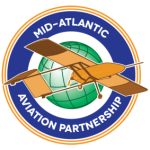The Mid-Atlantic Aviation Partnership at Virginia Tech has signed an agreement with The Omnicon Group, a New York-based engineering company with experience in the development, verification, and certification of both manned and unmanned aircraft. This collaboration will focus on the testing and certification of unmanned aircraft systems.
“At Virginia Tech, we see tremendous benefits in combining airworthiness certification and flight testing,” said Rose Mooney, executive director of the Mid-Atlantic Aviation Partnership. “We look forward to working with The Omnicon Group, the Federal Aviation Administration, and our consortium partners to offer a complete range of services to our customers interested in pursuing safe commercialization and integration of UAS technology.”
The Omnicon Group has assisted aerospace companies in obtaining airworthiness certifications for more than 90 percent of the world’s commercial aircraft. The Mid-Atlantic Aviation Partnership offers expertise in unmanned aircraft systems flight testing and safety regulations. These complementary capabilities will strengthen both organizations as they continue to grow their presence in the UAS arena.
“With this alliance we are excited to offer customers of both The Omnicon Group and Mid-Atlantic Aviation Partnership the opportunity to have a single source that can perform required safety analyses, software and hardware engineering support, and reliable flight testing,” said Karen J. Frank, The Omnicon Group’s Vice President of Corporate Development and Programs.
The Federal Aviation Administration selected the Mid-Atlantic Aviation Partnership, headquartered at the Institute for Critical Technology and Applied Science at Virginia Tech, in December 2013 as one of six national test sites to conduct research to integrate unmanned aircraft into the nation’s airspace.
Since then, Mid-Atlantic Aviation Partnership has worked with unmanned aircraft systems to aid emergency responders, survey energy pipeline infrastructure, study agricultural land, and teach reporters to cover news.
Source: Virginia Tech

